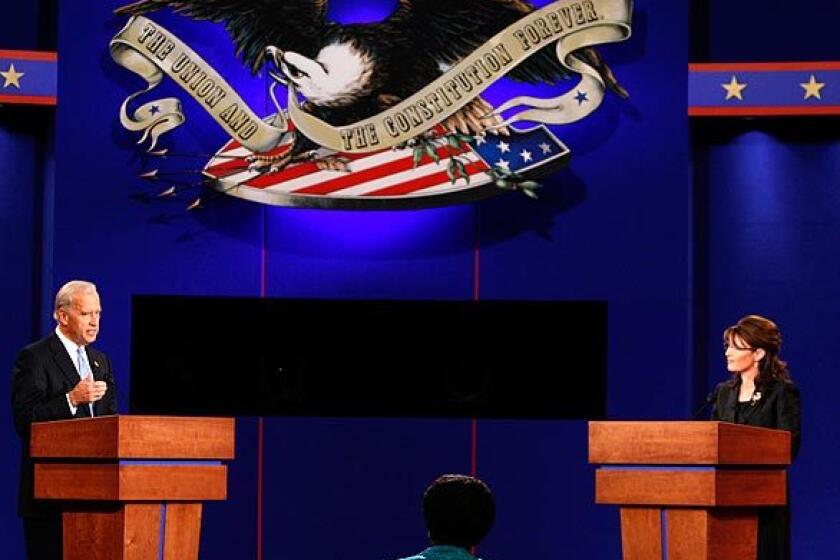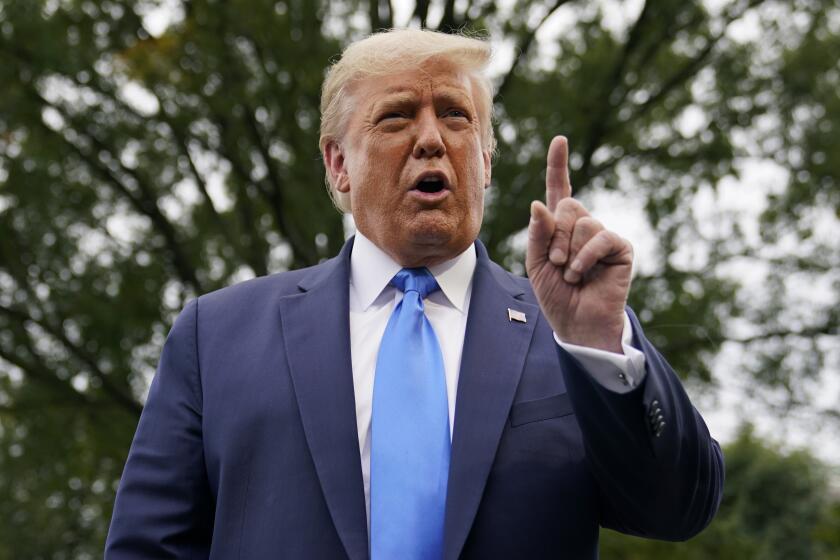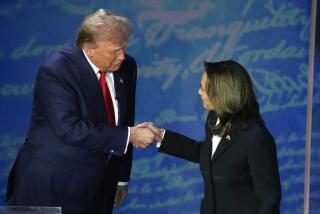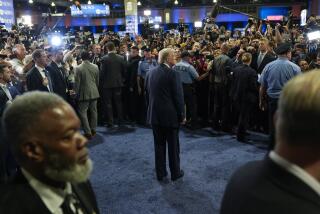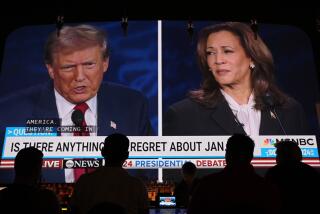The first presidential debate brings high stakes for Trump and Biden
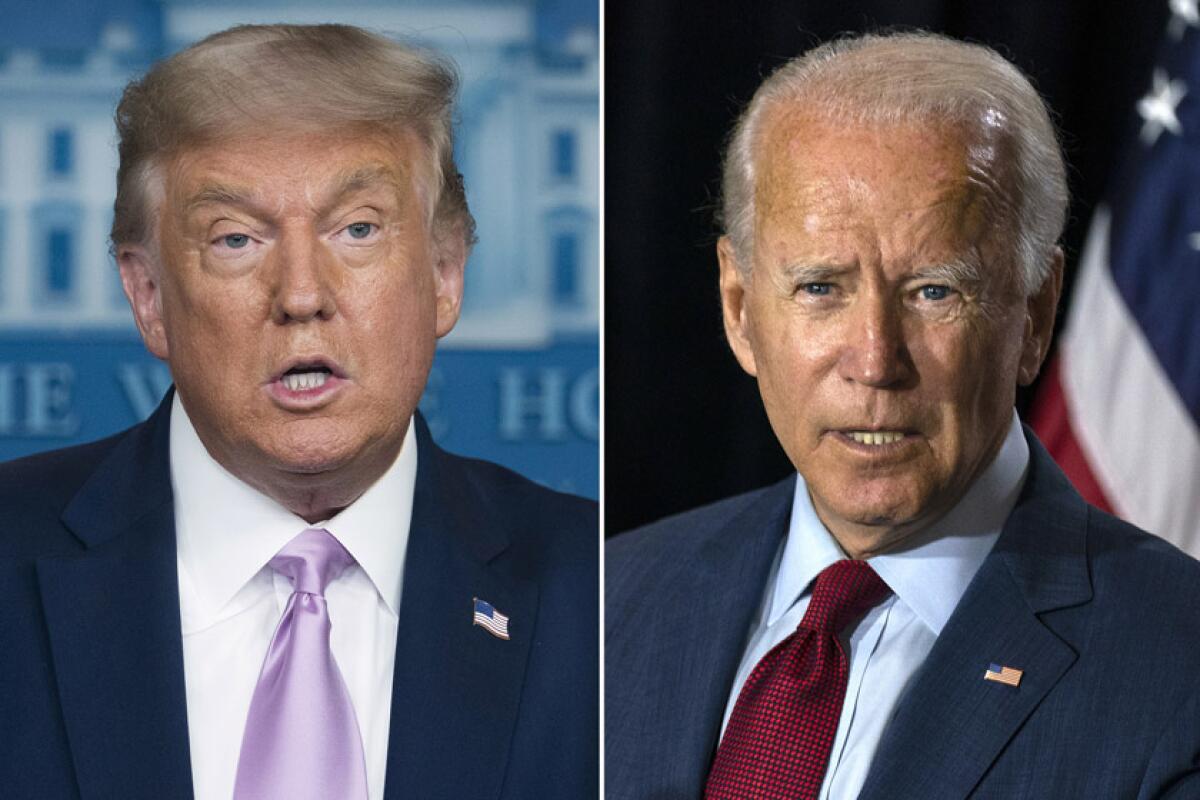
WASHINGTON â The first presidential debate between Joe Biden and President Trump has a strong chance of being the most-watched political event in U.S. history, and the enormous potential audience on Tuesday is just one factor that has heightened the stakes for both candidates.
For Trump, stuck for months on a losing trajectory, the debate stands as one of the few remaining opportunities to shift how Americans view the election and to reach voters beyond his deeply committed core of supporters.
For Biden, who has maintained a significant, but not unbeatable, lead nationally and in crucial swing states, the encounter provides a chance to bolster his standing with a key slice of the electorate â voters who have turned against the president but remain unconvinced about his challenger.
With that opportunity, however, comes risk for the former vice president, who, in debates during the primary elections, sometimes appeared to lack energy or focus.
Debates are often overrated as a turning point in campaigns, said Mike Murphy, the veteran Republican strategist and fervent Trump critic who co-directs USCâs Center for the Political Future. Research by political scientists shows that for all the attention they get, general-election debates only rarely have an impact that lasts more than a week or so.
âThis debate is a little different,â Murphy said, in part because Trump and his campaign have worked furiously to raise doubts in votersâ minds about Bidenâs mental fitness and physical stamina.
âFor Biden to break through and show heâs sharp and on top of it, thatâs an opportunity but also a risk,â Murphy said. âIf Biden has a bad debate, Trump has a whole month to exploit it.â
Democratic pollster Anna Greenberg agreed. âRepublicans have been very effectiveâ in spreading the idea that Biden is physically or mentally impaired, she said. âYou hear a lot of itâ in focus groups of voters.
Since most swing voters donât pay much attention to political news, the debate âwill probably be the first opportunity that a lot of voters have to see Biden and see that heâs not impaired,â she said. âThatâs the main thing.â
Indeed, many Republicans worry that Trump, with his frequent references to Biden as âsleepyâ or âout of it,â has âlowered the barâ too much for what voters may expect from the Democratic challenger, said Republican strategist Alex Conant, a former top aide to Sen. Marco Rubio of Florida.
âThatâs definitely a risk they run.â
President Trump and Joe Biden will hold their first of three debates on Tuesday. How are they preparing?
A potential parallel could be the 1980 election between President Carter and his Republican opponent, Ronald Reagan. The two held only one debate, on Oct. 28, just one week before the election. Carter entered the debate holding a narrow lead. But when voters saw Reagan onstage, he did not seem like the scary war hawk Democrats had warned against. Over the campaignâs final days, which included other events that damaged Carter, Reaganâs standing rose steadily, and he won by a large margin.
Biden has participated in dozens of debates during three presidential bids as well as vice presidential debates in 2008 and 2012. He got high marks for the 2012 matchup against then-Rep. Paul Ryan (R-Wis.), the GOPâs nominee. In 2008, his skill in the primary debates impressed his rival, then-Sen. Barack Obama, and was one of the reasons Obama picked him as a running mate.
âHe was strong, smart and much more disciplined than I expected,â Obama said to advisor David Axelrod when they first discussed Biden as a potential running mate, according to Axelrodâs memoir, âBeliever: My Forty Years in Politics.â
Biden participated in 14 debates that primary cycle even though he dropped out of the race just after the Iowa caucuses in January 2008. His most memorable debate line jabbed a Republican, former New York Mayor Rudolph W. Giuliani: âThere only three things he mentions in a sentence: A noun and a verb and 9/11. I mean, thereâs nothing else.â
His 2012 matchup with Ryan came at a crucial moment: Obama had done poorly in his first debate with Mitt Romney, the Republican presidential nominee, and Democrats badly needed Biden to do well to compensate.
He did: With an aggressive, in-your-face performance, Biden belittled the conservative lawmaker who was decades younger than him. Republicans called Bidenâs smirking and condescension disrespectful, but Democrats were reinvigorated.
âWe needed him to deliver an incredible performance against Paul Ryan,â said Dan Pfeiffer, an Obama advisor at the time. âBiden did well. It was a huge boost to our campaign.â
In this election cycle, Bidenâs primary debates were uneven. In the early going â the debates that got the biggest audiences â he often seemed halting. Supporters say that reflected rustiness after seven years off the debate stage and note that this spring, when he went one-on-one with Sen. Bernie Sanders of Vermont, he did much better.
Trumpâs refusal to say that heâd peacefully transfer power may just be bluster. But there are steps he could take, and Democrats are on the alert.
Trump, by contrast, did not fare especially well during the debates four years ago. The most memorable image of the encounters â his walking behind Hillary Clinton onstage as she spoke â drew cheers from his fans, who saw the move as bold, and protests from her supporters, who called him a stalker. The divided reaction illustrates the degree to which most viewers filter a debate through their own preconceptions.
The fact that Trump won the election has created an impression in retrospect that he must have beaten Clinton in the debates. But polls at the time generally showed him losing ground after the encounters, then climbing back up as the debates faded from the news.
That year, more than 84 million people watched their first debate, according to Nielsenâs ratings. That set a record. With attention to this yearâs election at an all-time high, the audience could be larger. Viewership in that range could approach two-thirds of the number of people expected to vote.
In todayâs fractured media world, no other moment in a campaign draws such a mass audience. In particular, debates get attention not only from hardcore partisans, but also less committed voters.
Those swing voters will form a prime audience for both candidates Tuesday.
Polls show that the vast majority of voters have firmly made up their minds about which candidate they support. For them, a debate can serve as a motivational exercise.
But a small group of voters do remain undecided. A few swing back and forth between Trump and Biden. A somewhat larger group âswings between voting and their couch,â said Ashley Kirzinger, associate director of survey research at the Kaiser Family Foundation, which has looked at uncertain voters in key states.
A recent survey by Kaiser and the Cook Political Report of voters in three Sun Belt battleground states â Arizona, Florida, North Carolina â found that three-quarters of voters had definitely made up their minds. They were almost evenly divided between the two sides. One in 10 said they were undecided, while an additional 3% said that they would probably vote for one candidate but that a chance remained that they might change their minds.
A look at where President Trump and Joe Biden stand on key issues in the 2020 election, including healthcare, immigration, police reform and climate.
Those less uncertain voters were younger than average, not particularly partisan and, at least in the three Sun Belt states, significantly more likely to be Latino, Kirzinger said.
Across the three states, a majority of them had a negative view of Trump and a positive view of Biden.
Two-thirds of the swing voters see Trump as âunpredictableâ â a quality they see as bad, Kirzinger said. They prefer Bidenâs leadership style and his position on issues including healthcare and handling the coronavirus.
But they remain uncertain in part because ânearly half say they think Biden is too old to be president,â she said, and only 4 in 10 see him as a âstrong leader.â
Strategists in both parties said Trumpâs goal in appealing to those uncommitted voters should be to shift the election from a referendum on him â a contest he has little chance of winning â to a more direct focus on Bidenâs flaws.
Thatâs a difficult task for any president, because reelection campaigns typically focus on the incumbent. Itâs even harder for Trump, who hates to cede attention to anyone else.
Bidenâs challenge is different: Keep the focus on Trump while generating more enthusiasm for himself, which could boost turnout on his side.
The same polls that show Biden with a persistent lead also show that a large share of his voters say theyâre motivated more to cast a ballot against Trump than for Biden.
Those surveys also show that despite Bidenâs decades in public life, a lot of voters â especially younger Americans, people in immigrant communities and less partisan voters who donât pay huge attention to politics â still donât know that much about him.
âBiden is not that well definedâ in a lot of votersâ minds, Murphy said. That may be hard to believe, he said, for people who are immersed in the political world, but for a lot of people âheâs just an old senator.â
In Florida, where anti-Trump groups have done extensive research, a lack of information about who Biden is and what he stands for is an issue for many Latino voters and young people, he said.
âHeâs got 40 days to fill that picture in,â Murphy said.
The debate is a key part of doing so. The uncertain voters are ânot political news consumers, and reaching them is really hard,â Kirzinger said. âThey may not watch the debate, but theyâll definitely hear the narrative coming out of it.â
More to Read
Get the L.A. Times Politics newsletter
Deeply reported insights into legislation, politics and policy from Sacramento, Washington and beyond. In your inbox three times per week.
You may occasionally receive promotional content from the Los Angeles Times.
